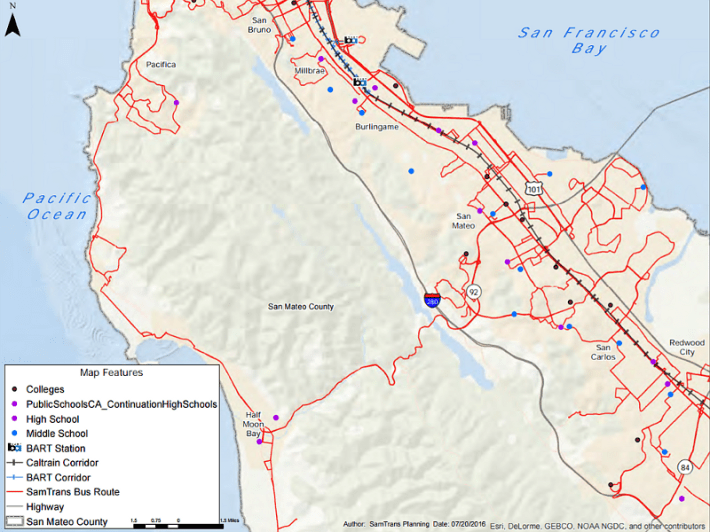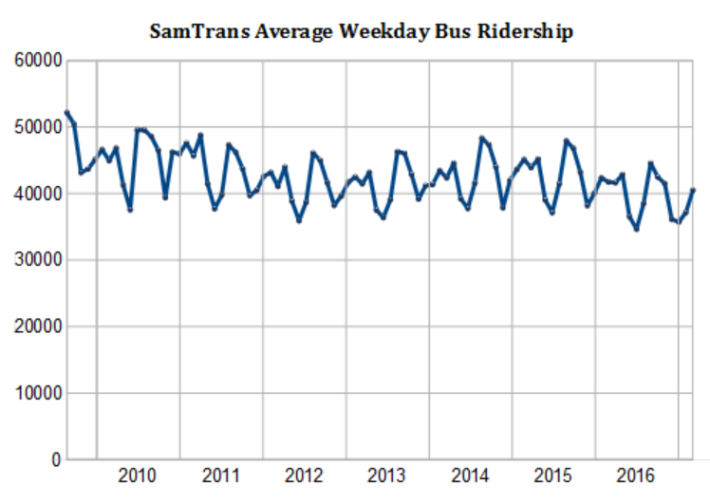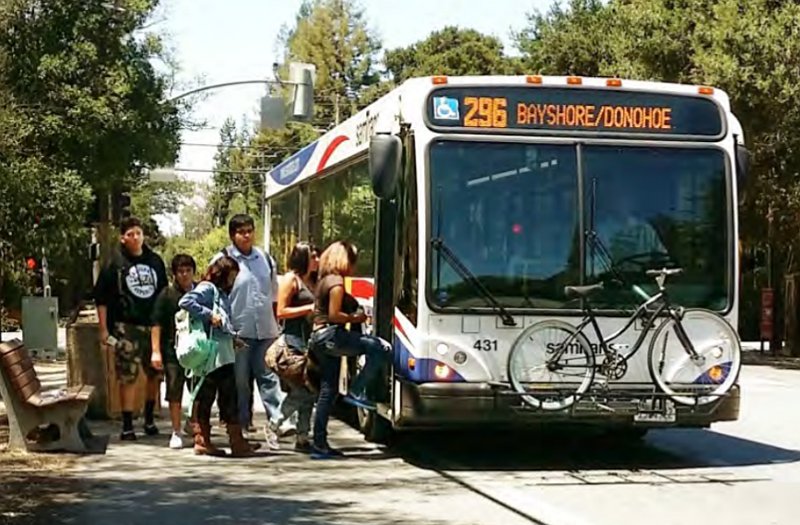At last Wednesday’s San Mateo County Transit District (SamTrans) Board of Directors meeting planners presented the agency's draft Youth Mobility Plan [PDF], “a strategic blueprint for how SamTrans can address the mobility needs of youth in San Mateo County and cultivate the next generation of bus customers.” The plan recommends a number of initiatives to boost the agency’s declining ridership by improving quality of service for youth, defined by the plan as residents ages 24 and under.
“Today’s youth passengers are tomorrow’s adult passengers,” said SamTrans Senior Planner Lindsay Kiner at the meeting. “Research has shown that adults are more likely to use transit if they are exposed to it as youth.”
SamTrans bus network is designed partly to serve as many of the county’s schools as possible, with 44 out of 95 routes including stops at a public middle school, high school, or community college. 28 percent of SamTrans bus trips are taken to or from a school, and over one-third of all SamTrans bus passengers are ages 24 or younger. The agency identified the middle and high school age groups as having the most potential for ridership growth and for retaining future transit users in its 2015-2019 Strategic Plan.

Some of the Youth Mobility Plan’s initiatives have already been approved, including the establishment of a Youth Mobility Coordinator position at the agency, which was one of eight new positions approved as part of SamTrans's operating budget at Wednesday’s Board meeting. The establishment of a Youth Ambassador Program is also underway.
“This program would invite a group of high school and college age youths to promote SamTrans services and engage in the planning process,” said Kiner. “The idea is to get youth engaged with us and bring us ideas on how to improve service.” Through the program, eight students from throughout the county would conduct travel trainings and represent SamTrans on social media and at school events. The Youth Ambassadors would each receive a stipend of $200 and free monthly passes for the school year.
“We need to hear directly from youth to set the right direction,” said SamTrans Board of Directors member and San Mateo County Supervisor Dave Pine.

Another significant initiative featured in the plan is an expansion of the bus agency’s Way2Go program to include the county’s three community colleges. Similar to the Caltrain GoPass, the program allows businesses and residential communities to purchase annual, unlimited-trip discount passes for their employees or residents but isn’t currently available for the colleges to purchase for students. The Way2Go pass would likely be available for students at Stanford University and San Francisco State University as well, since these two schools lie just outside San Mateo County’s borders and are served by SamTrans buses.
“Some of the recommendations include having [onboard] wifi and phone chargers,” reported SamTrans Citizens Advisory Committee member and Youth Leadership Institute Program Manager Michelle Buzbee of a survey of 350 students in Half Moon Bay and South San Francisco conducted last year as part of the plan’s outreach efforts. “Youth also mentioned that having more shelters at bus stops to protect from bad weather would provide a stronger sense of safety.”
Other initiatives identified for future consideration by the plan but not yet approved or funded include offering free passes for youth from low-income families, as the San Francisco Municipal Transportation Agency (Muni) piloted in 2013. SamTrans is also looking at offering free transit on school routes for two weeks at the beginning of the school year, extending the discounted youth fare to include residents between ages 18 and 24 years, and developing a multi-agency youth pass that would include SamTrans, Caltrain, and BART.





